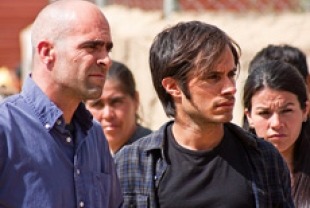"Pure, clean, sparkling water. Surely water is one of our healthiest drinks. It's easy to forget, in our thirst, as we gulp down this precious gift that some people don't have pure water. Some water has to be boiled in order to be safe for drinking. Some people have to walk great distances to get the water they need. As we allow ourselves to remember this, it can make us more grateful." This is a good reminder of reality from Macrina Wiederkehr in Gold in Your Memories. In addition:
• One billion people worldwide have no access to clean water within a 15-minute walk of their homes.
• 25 million people die each year from contaminated water (that's the equivalent of the entire population of Canada.)
• The ancient ideal of water as a commons is on its way out as water privatization by large corporations and governments increases.
• Water is essential for our lives. As the poet W.H. Auden once put it: "Thousands have lived without love, none live without water."
Costa (Luis Tosar) is the shrewd, practical, and tough producer of a film company in Bolivia shooting a daring drama revealing the selfishness, greed, and savagery of the Spanish conquest of South America led by Christopher Columbus. Underneath all the bravado about exploration is the simple lust for gold; it is taken from the indigenous people who are then made made subservient to the invaders.
Sebastian (Gael Garcia Bernal) is the conflicted director who feels that the film he is shooting is highly creative and politically radical. He is a man with a conscience as demonstrated when Daniel (Juan Carlos Aduviri) convinces him to see all the local people who have come for miles to audition for roles as extras in the film. Sebastian is so impressed with this angry young man's passion that he gives him a plum role as Hatuey, a Taino chief who led a rebellion against the Spanish.
Costa is against hiring Daniel at first but is pleased when financial backers of the film are impressed with this young man's performance. However, when Daniel hears Costa bragging on the phone about getting extras for two dollars a day, he lets the crass producer know that he spent time working construction jobs in the U.S. But what really separates the two men is Daniel's leadership of the popular movement against the Bolivian government's privatization of the water supply. In one scene, a band of mothers push some soldiers away from a well. Eventually, this fight over water rights spreads out into the streets. In another key scene the mayor of the city expresses his support for the the privatization of water and the need to stop the troublemakers.
Even the Rain is directed by Iciar Bollain based on a screenplay by Paul Laverty who has written many Ken Loach films. A note appears on the screen that the film is dedicated to Howard Zinn, who died recently. He would appreciate the double whammy critique of the past imperialism of the Spanish conquerors and the current-day superiority and entitlements that Costa, Sebastian, and others working on the film feel toward the Bolivians. It is not the director but the producer whose heart is softened and transformed by the suffering of the people. His heroic act of selflessness and compassion is a wonder to behold and a sign that people can change. Meanwhile, Sebastian is left alone contemplating: Many people can live without a movie about Columbus, but none can live without water.
